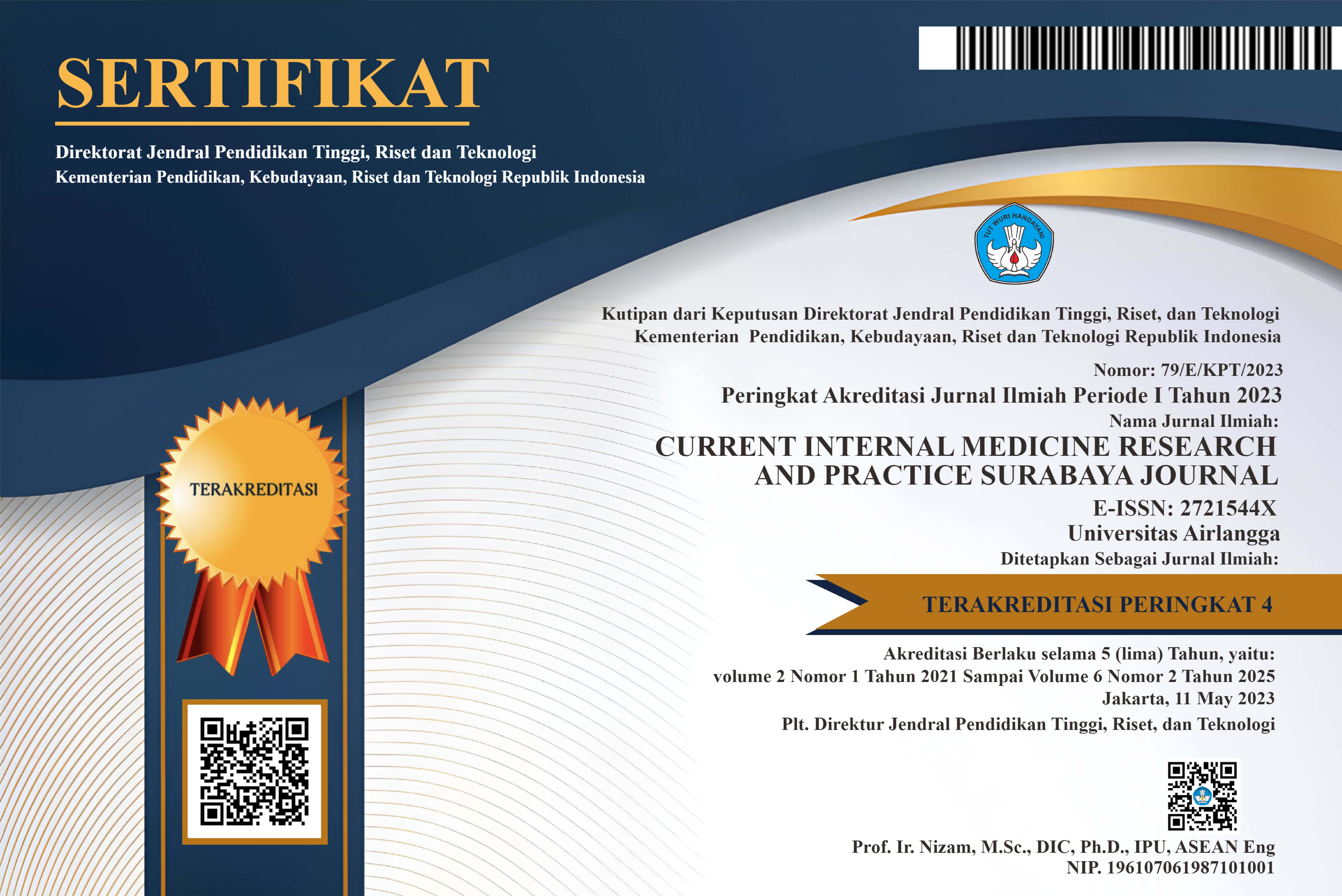Comorbid Diseases and Outcomes of Critically Ill COVID-19 Patients Admitted to an Indonesian Intensive Care Unit from May to October 2021
Downloads
Introduction: Coronavirus disease 2019 (COVID-19) is an infectious disease caused by severe acute respiratory syndrome coronavirus 2 (SARS‑CoV‑2). The spread of COVID-19 has become a worldwide health threat, with 583,038,110 cases and a death toll of 6,416,023. This study attempted to determine the relationship of age, sex, and comorbid diseases with the outcomes of critically ill COVID-19 patients at Prof. Dr. IGNG Ngoerah Central General Hospital, Denpasar, Indonesia.
Methods: This analytic study employed a retrospective approach, analyzing secondary data from medical records using a purposive sampling method. The research included univariate analysis, bivariate analysis using the chi-square test, and multivariate analysis using a general linear model performed with the assistance of IBM SPSS Statistics for Windows, version 23.0 (IBM Corp., Armonk, N.Y., USA). A statistical analysis result with a p-value of less than 0.05 was deemed significant.
Results: A total of 264 critically ill COVID-19 patients were hospitalized in the Intensive Care Unit of Prof. Dr. IGNG Ngoerah Central General Hospital from May to October 2021. Comorbid diseases were present in 215 patients. The comorbid diseases that had the greatest impact on increasing mortality were diabetes mellitus, hypertension, kidney disease, and cardiovascular disease (p=0.000–0.006, 95% CI).
Conclusion: Age and sex do not have any significant relationship with the outcomes of critically ill COVID-19 patients. Meanwhile, comorbid diseases, such as diabetes mellitus, hypertension, and renal and cardiovascular diseases, pose a significant impact on the mortality rate of critically ill COVID-19 patients.
Highlights:
1. This study investigated patients who were critically ill with COVID-19 to determine the relationship between age, sex, comorbidities, and patient outcomes.
2. The findings of this study may provide additional data on the impact of comorbidities on the severity of COVID-19, which can be valuable to prevent mortality due to the infection.
Alkautsar A (2021). Hubungan penyakit komorbid dengan tingkat keparahan pasien COVID-19. Jurnal Medika Hutama 3: 1488–1494. Retrieved from https://jurnalmedikahutama.com/index.php/JMH/article/view/302.
Andrade C (2021). The inconvenient truth about convenience and purposive samples. Indian Journal of Psychological Medicine 43(1): 86–88. doi: 10.1177/0253717620977000.
Campbell S, Greenwood M, Prior S, Shearer T, Walkem K, Young S, Bywaters D, Walker K (2020). Purposive sampling: Complex or simple? Research case examples. Journal of Research in Nursing 25(8): 652–661. doi: 10.1177/1744987120927206.
Center for Strategic and International Studies (2021). Previous Southeast Asia COVID-19 tracker updates. Retrieved from https://www.csis.org/programs/southeast-asia-program/projects/previous-southeast-asia-covid-19-tracker-updates.
Cibro AAL, Skripsiana NS, Muthmainah N, Heriyani F, Zaitun N (2022). Gambaran karakteristik dan penyakit komorbid pada pasien konfirmasi COVID-19 di RSUD Ulin Banjarmasin tahun 2020. Homeostasis 5(1): 11. doi: 10.20527/ht.v5i1.5157.
Daud ML, Nelwan JE, Ratag BT (2022). Hubungan antara umur dan jenis kelamin dengan kejadian coronavirus disease-19 di Kota Bitung tahun 2020. Kesmas: Jurnal Kesehatan Masyarakat Universitas Sam Ratulangi 11(1): 190–195. Retrieved from https://ejournal.unsrat.ac.id/v3/index.php/kesmas/article/view/39215.
Drew C, Adisasmita AC (2021). Gejala dan komorbid yang memengaruhi mortalitas pasien positif COVID-19 di Jakarta Timur, Maret-September 2020. Tarumanagara Medical Journal 3(1): 42–51. doi: 10.24912/tmj.v3i2.11742.
Fang L, Karakiulakis G, Roth M (2020). Are patients with hypertension and diabetes mellitus at increased risk for COVID-19 infection? The Lancet Respiratory Medicine 8(4): e21. doi: 10.1016/S2213-2600(20)30116-8.
Hasnidar, Tasnim, Sitorus S, Hidayati W, Mustar, Fhirawati, Yuliani M, Marzuki I, Yunianto AE, Susilawaty A, Puspita R, Pattola, Sianturi E, Sulfianti (2020). Ilmu kesehatan masyarakat. (A. Rikki, Ed.). Yayasan Kita Menulis. Retrieved from https://scholar.google.co.id/citations?view_op=view_citation&hl=id&user=fADtJLIAAAAJ&citation_for_view=fADtJLIAAAAJ:IjCSPb-OGe4C.
Hassanein M, Radhakrishnan Y, Sedor J, Vachharajani T, Vachharajani VT, Augustine J, Demirjian S, Thomas G (2020). COVID-19 and the kidney. Cleveland Clinic Journal of Medicine 87(10): 619–631. doi: 10.3949/ccjm.87a.20072.
Huang C, Wang Y, Li X, Ren L, Zhao J, Hu Y, Zhang L, Fan G, Xu J, Gu X, Cheng Z, Yu T, Xia J, Wei Y, Wu W, Xie X, Yin W, Li H, Liu M, Xiao Y, Gao H, Guo L, Xie J, Wang G, Jiang R, Gao Z, Jin Q, Wang J, Cao B (2020). Clinical features of patients infected with 2019 novel coronavirus in Wuhan, China. The Lancet 395(10223): 497–506. doi: 10.1016/S0140-6736(20)30183-5.
IBM Corp. Released 2015. IBM SPSS Statistics for Windows. IBM Corp., Armonk, NY. Retrieved from https://www.ibm.com/products/spss-statistics.
Kangdra WY (2021). Karakteristik klinis dan faktor komorbid pada pasien dalam pengawasan (PDP) coronavirus disease 2019 (COVID-19) di RS Mitra Medika Amplas. Universitas Sumatera Utara. Retrieved from https://repositori.usu.ac.id/handle/123456789/30672.
Karyono DR, Wicaksana AL (2020). Current prevalence, characteristics, and comorbidities of patients with COVID-19 in Indonesia. Journal of Community Empowerment for Health 3(2): 77. doi: 10.22146/jcoemph.57325.
McHugh ML (2013). The Chi-square test of independence. Biochemia Medica : 143–149. doi: 10.11613/BM.2013.018.
Muniyappa R, Gubbi S (2020). COVID-19 pandemic, coronaviruses, and diabetes mellitus. American Journal of Physiology-Endocrinology and Metabolism 318(5): E736–E741. doi: 10.1152/ajpendo.00124.2020.
Pearson-Stuttard J, Blundell S, Harris T, Cook DG, Critchley J (2016). Diabetes and infection: Assessing the association with glycaemic control in population-based studies. The Lancet Diabetes & Endocrinology 4(2): 148–158. doi: 10.1016/S2213-8587(15)00379-4.
Putri NA, Putra AE, Mariko R (2021). Hubungan usia, jenis kelamin dan gejala dengan kejadian COVID-19 di Sumatera Barat. Majalah Kedokteran Andalas 44(2). Retrieved from https://jurnalmka.fk.unand.ac.id/index.php/art/issue/view/45.
Rajpal A, Rahimi L, Ismail‐Beigi F (2020). Factors leading to high morbidity and mortality of COVID-19 in patients with type 2 diabetes. Journal of Diabetes 12(12): 895–908. doi: 10.1111/1753-0407.13085.
Ruapertiwi AM (2021). Epidemiologi pasien coronavirus disease di Rumah Sakit Tingkat II Putri Hijau Kesdam I/Bukit Barisan Medan Sumatera Utara. Universitas Islam Negeri Sumatera Utara. Retrieved from http://repository.uinsu.ac.id/11892/.
Siswanto (2020, November 23). Mau selamat dari COVID-19? Media Indonesia. Retrieved from https://mediaindonesia.com/opini/363002/mau-selamat-dari-covid-19.
Styawan DA (2021). Pandemi COVID-19 dalam perspektif demografi. Seminar Nasional Official Statistics 2020(1): 182–189. doi: 10.34123/semnasoffstat.v2020i1.716.
Talari K, Goyal M (2020). Retrospective studies – Utility and caveats. Journal of the Royal College of Physicians of Edinburgh 50(4): 398–402. doi: 10.4997/jrcpe.2020.409.
The Novel Coronavirus Pneumonia Emergency Response Epidemiology Team (2020). Vital surveillances: The epidemiological characteristics of an outbreak of 2019 novel coronavirus diseases (COVID-19) — China, 2020. China CDC Weekly 2(8): 113–122. Retrieved from https://weekly.chinacdc.cn/article/id/e53946e2-c6c4-41e9-9a9b-fea8db1a8f51.
Vassar M, Matthew H (2013). The retrospective chart review: Important methodological considerations. Journal of Educational Evaluation for Health Professions 10: 12. doi: 10.3352/jeehp.2013.10.12.
Wenham C, Smith J, Morgan R (2020). COVID-19: The gendered impacts of the outbreak. The Lancet 395(10227): 846–848. doi: 10.1016/S0140-6736(20)30526-2.
World Health Organization (2020). Severe acute respiratory syndrome (SARS). Retrieved from https://www.who.int/health-topics/severe-acute-respiratory-syndrome#tab=tab_1.
World Health Organization (2022). Situation reports: Coronavirus disease (COVID-19) Epidemiological Updates and Monthly Operational Updates. Retrieved from https://www.who.int/emergencies/diseases/novel-coronavirus-2019/situation-reports/situation-reports-archive.
Zhou F, Yu T, Du R, Fan G, Liu Y, Liu Z, Xiang J, Wang Y, Song B, Gu X, Guan L, Wei Y, Li H, Wu X, Xu J, Tu S, Zhang Y, Chen H, Cao B (2020). Clinical course and risk factors for mortality of adult inpatients with COVID-19 in Wuhan, China: A retrospective cohort study. The Lancet 395(10229): 1054–1062. doi: 10.1016/S0140-6736(20)30566-3.
Copyright (c) 2024 Katrin Wilentina Siahaan, I Ketut Agus Somia, I Made Susila Utama, Ni Made Dewi Dian, Anak Agung Ayu Yuli Gayatri, Cokorda Agung Wahyu Purnamasidhi, Ketut Tuti Parwati Merati

This work is licensed under a Creative Commons Attribution-ShareAlike 4.0 International License.
Copyright (c) Author
1. The journal allows the author to hold the copyright of the article without restrictions.
2. The journal allows the author(s) to retain publishing rights without restrictions.
3. The formal legal aspect of journal publication accessibility refers to Creative Commons Atribution-Share Alike 4.0 (CC BY-SA).






















